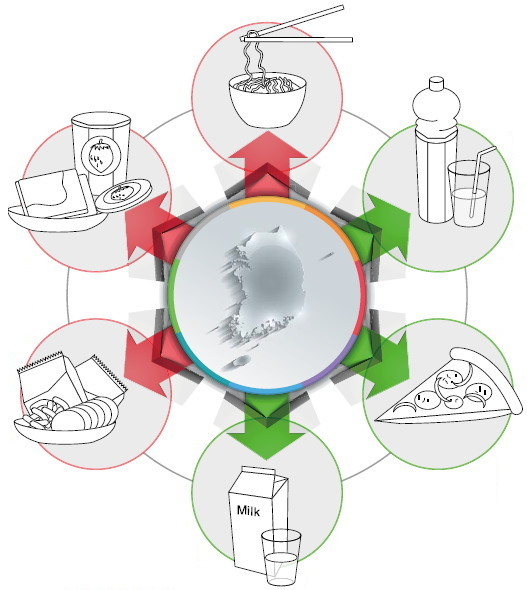Foodpolis to act as bridge to China
Global firms race to capitalize on Korea’s food cluster
By Shin Ji-hyePublished : Oct. 7, 2014 - 21:06
Top global food companies are eyeing South Korea’s food cluster Foodpolis with keen interest as it is expected to serve as a stepping stone for expanding into China, Asia’s largest food market.
Up to 48 foreign companies, including Italy’s Forno d’Asolo, the Netherlands’ NIZO food, America’s Hampton Grains and France’s SEB, have signed pacts with the local Agriculture Ministry to set up shop in Foodpolis when it is completed by 2016 in Iksan, North Jeolla Province.
“A growing number of global companies are planning to tap into the Chinese food market by using Foodpolis as a bridge,” said Lee Ju-myeung, head of the Agriculture Ministry’s Food Industry Policy Bureau.
China’s potential as a food market is enormous, as the nation’s bulging middle class has been manifesting a growing appetite for imported food.

The Chinese middle class is expected to grow to 450 million by 2020, according to consulting firm McKinsey & Co. It will then account for 57 percent of China’s population, reflecting a surge from only 8 percent in 2010.
Through Foodpolis, overseas food companies can reach out to these eager consumers ― and also those in equally significant Asian markets such as Japan ― with ease.
“It takes only a day to ship goods to Shanghai from Foodpolis while, for companies located in Europe, it would (otherwise) take about a month or longer. By operating from Foodpolis, companies can save both time and money, while also guaranteeing the quality and freshness of the food delivered,” said an official in charge of distribution at the Agriculture Ministry.
Foodpolis also would make it easier for domestic firms to gain a global reach.
“We plan to make Foodpolis an outpost for globalizing the local food industry. The government will work hard to improve the competitiveness of the industry by removing unnecessary regulations,” said Lee Dong-phil, the Agriculture Minister.
If the free trade agreement negotiations with China are concluded this year, more tax benefits are expected for firms in Foodpolis.
Apart from the geographical factor, Korea’s strong economic network is another perk. The nation has signed FTAs with 47 nations, the highest number among Asian countries. These partners account for more than 60 percent of the world’s gross domestic product.
The nation is in negotiations with 15 others including Indonesia and Vietnam.
“We hope our goods can spread out into the world through Korea’s extensive economic ties with its FTA partners,” said the head of a Chinese snack company that signed an MOU with the ministry last October. The name of the company could not be revealed due to confidentiality agreements.
Foodpolis is a 553 billion won ($524 million) project that is expected to put Seoul on the Asian food map. The Korean government is in talks with up to 160 domestic and foreign companies, colleges and research centers that are vying for a spot at Foodpolis.
By Shin Ji-hye (shinjh@heraldcorp.com)
Up to 48 foreign companies, including Italy’s Forno d’Asolo, the Netherlands’ NIZO food, America’s Hampton Grains and France’s SEB, have signed pacts with the local Agriculture Ministry to set up shop in Foodpolis when it is completed by 2016 in Iksan, North Jeolla Province.
“A growing number of global companies are planning to tap into the Chinese food market by using Foodpolis as a bridge,” said Lee Ju-myeung, head of the Agriculture Ministry’s Food Industry Policy Bureau.
China’s potential as a food market is enormous, as the nation’s bulging middle class has been manifesting a growing appetite for imported food.

The Chinese middle class is expected to grow to 450 million by 2020, according to consulting firm McKinsey & Co. It will then account for 57 percent of China’s population, reflecting a surge from only 8 percent in 2010.
Through Foodpolis, overseas food companies can reach out to these eager consumers ― and also those in equally significant Asian markets such as Japan ― with ease.
“It takes only a day to ship goods to Shanghai from Foodpolis while, for companies located in Europe, it would (otherwise) take about a month or longer. By operating from Foodpolis, companies can save both time and money, while also guaranteeing the quality and freshness of the food delivered,” said an official in charge of distribution at the Agriculture Ministry.
Foodpolis also would make it easier for domestic firms to gain a global reach.
“We plan to make Foodpolis an outpost for globalizing the local food industry. The government will work hard to improve the competitiveness of the industry by removing unnecessary regulations,” said Lee Dong-phil, the Agriculture Minister.
If the free trade agreement negotiations with China are concluded this year, more tax benefits are expected for firms in Foodpolis.
Apart from the geographical factor, Korea’s strong economic network is another perk. The nation has signed FTAs with 47 nations, the highest number among Asian countries. These partners account for more than 60 percent of the world’s gross domestic product.
The nation is in negotiations with 15 others including Indonesia and Vietnam.
“We hope our goods can spread out into the world through Korea’s extensive economic ties with its FTA partners,” said the head of a Chinese snack company that signed an MOU with the ministry last October. The name of the company could not be revealed due to confidentiality agreements.
Foodpolis is a 553 billion won ($524 million) project that is expected to put Seoul on the Asian food map. The Korean government is in talks with up to 160 domestic and foreign companies, colleges and research centers that are vying for a spot at Foodpolis.
By Shin Ji-hye (shinjh@heraldcorp.com)




![[Herald Interview] 'Amid aging population, Korea to invite more young professionals from overseas'](http://res.heraldm.com/phpwas/restmb_idxmake.php?idx=644&simg=/content/image/2024/04/24/20240424050844_0.jpg&u=20240424200058)















